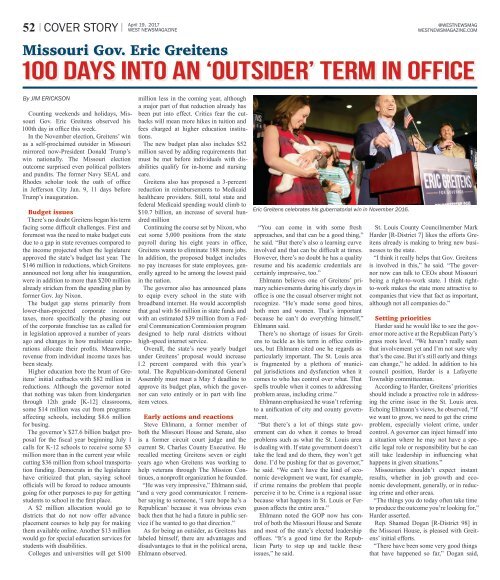West Newsmagazine 4-19-17
Local news, local politics and community events for West St. Louis County Missouri.
Local news, local politics and community events for West St. Louis County Missouri.
Create successful ePaper yourself
Turn your PDF publications into a flip-book with our unique Google optimized e-Paper software.
52 I COVER STORY I<br />
April <strong>19</strong>, 20<strong>17</strong><br />
WEST NEWSMAGAZINE<br />
Missouri Gov. Eric Greitens<br />
@WESTNEWSMAG<br />
WESTNEWSMAGAZINE.COM<br />
100 days into an ‘outsider’ term in office<br />
By JIM ERICKSON<br />
Counting weekends and holidays, Missouri<br />
Gov. Eric Greitens observed his<br />
100th day in office this week.<br />
In the November election, Greitens’ win<br />
as a self-proclaimed outsider in Missouri<br />
mirrored now-President Donald Trump’s<br />
win nationally. The Missouri election<br />
outcome surprised even political pollsters<br />
and pundits. The former Navy SEAL and<br />
Rhodes scholar took the oath of office<br />
in Jefferson City Jan. 9, 11 days before<br />
Trump’s inauguration.<br />
Budget issues<br />
There’s no doubt Greitens began his term<br />
facing some difficult challenges. First and<br />
foremost was the need to make budget cuts<br />
due to a gap in state revenues compared to<br />
the income projected when the legislature<br />
approved the state’s budget last year. The<br />
$146 million in reductions, which Greitens<br />
announced not long after his inauguration,<br />
were in addition to more than $200 million<br />
already stricken from the spending plan by<br />
former Gov. Jay Nixon.<br />
The budget gap stems primarily from<br />
lower-than-projected corporate income<br />
taxes, more specifically the phasing out<br />
of the corporate franchise tax as called for<br />
in legislation approved a number of years<br />
ago and changes in how multistate corporations<br />
allocate their profits. Meanwhile,<br />
revenue from individual income taxes has<br />
been steady.<br />
Higher education bore the brunt of Greitens’<br />
initial cutbacks with $82 million in<br />
reductions. Although the governor noted<br />
that nothing was taken from kindergarten<br />
through 12th grade [K-12] classrooms,<br />
some $14 million was cut from programs<br />
affecting schools, including $8.6 million<br />
for busing.<br />
The governor’s $27.6 billion budget proposal<br />
for the fiscal year beginning July 1<br />
calls for K-12 schools to receive some $3<br />
million more than in the current year while<br />
cutting $36 million from school transportation<br />
funding. Democrats in the legislature<br />
have criticized that plan, saying school<br />
officials will be forced to reduce amounts<br />
going for other purposes to pay for getting<br />
students to school in the first place.<br />
A $2 million allocation would go to<br />
districts that do not now offer advance<br />
placement courses to help pay for making<br />
them available online. Another $13 million<br />
would go for special education services for<br />
students with disabilities.<br />
Colleges and universities will get $100<br />
million less in the coming year, although<br />
a major part of that reduction already has<br />
been put into effect. Critics fear the cutbacks<br />
will mean more hikes in tuition and<br />
fees charged at higher education institutions.<br />
The new budget plan also includes $52<br />
million saved by adding requirements that<br />
must be met before individuals with disabilities<br />
qualify for in-home and nursing<br />
care.<br />
Greitens also has proposed a 3-percent<br />
reduction in reimbursements to Medicaid<br />
healthcare providers. Still, total state and<br />
federal Medicaid spending would climb to<br />
$10.7 billion, an increase of several hundred<br />
million<br />
Continuing the course set by Nixon, who<br />
cut some 5,000 positions from the state<br />
payroll during his eight years in office,<br />
Greitens wants to eliminate 188 more jobs.<br />
In addition, the proposed budget includes<br />
no pay increases for state employees, generally<br />
agreed to be among the lowest paid<br />
in the nation.<br />
The governor also has announced plans<br />
to equip every school in the state with<br />
broadband internet. He would accomplish<br />
that goal with $6 million in state funds and<br />
with an estimated $39 million from a Federal<br />
Communication Commission program<br />
designed to help rural districts without<br />
high-speed internet service.<br />
Overall, the state’s new yearly budget<br />
under Greitens’ proposal would increase<br />
1.2 percent compared with this year’s<br />
total. The Republican-dominated General<br />
Assembly must meet a May 5 deadline to<br />
approve its budget plan, which the governor<br />
can veto entirely or in part with line<br />
item vetoes.<br />
Early actions and reactions<br />
Steve Ehlmann, a former member of<br />
both the Missouri House and Senate, also<br />
is a former circuit court judge and the<br />
current St. Charles County Executive. He<br />
recalled meeting Greitens seven or eight<br />
years ago when Greitens was working to<br />
help veterans through The Mission Continues,<br />
a nonprofit organization he founded.<br />
“He was very impressive,” Ehlmann said,<br />
“and a very good communicator. I remember<br />
saying to someone, ‘I sure hope he’s a<br />
Republican’ because it was obvious even<br />
back then that he had a future in public service<br />
if he wanted to go that direction.”<br />
As for being an outsider, as Greitens has<br />
labeled himself, there are advantages and<br />
disadvantages to that in the political arena,<br />
Ehlmann observed.<br />
Eric Greitens celebrates his gubernatorial win in November 2016.<br />
“You can come in with some fresh<br />
approaches, and that can be a good thing,”<br />
he said. “But there’s also a learning curve<br />
involved and that can be difficult at times.<br />
However, there’s no doubt he has a quality<br />
resume and his academic credentials are<br />
certainly impressive, too.”<br />
Ehlmann believes one of Greitens’ primary<br />
achievements during his early days in<br />
office is one the casual observer might not<br />
recognize. “He’s made some good hires,<br />
both men and women. That’s important<br />
because he can’t do everything himself,”<br />
Ehlmann said.<br />
There’s no shortage of issues for Greitens<br />
to tackle as his term in office continues,<br />
but Ehlmann cited one he regards as<br />
particularly important. The St. Louis area<br />
is fragmented by a plethora of municipal<br />
jurisdictions and dysfunction when it<br />
comes to who has control over what. That<br />
spells trouble when it comes to addressing<br />
problem areas, including crime.”<br />
Ehlmann emphasized he wasn’t referring<br />
to a unification of city and county government.<br />
“But there’s a lot of things state government<br />
can do when it comes to broad<br />
problems such as what the St. Louis area<br />
is dealing with. If state government doesn’t<br />
take the lead and do them, they won’t get<br />
done. I’d be pushing for that as governor,”<br />
he said. “We can’t have the kind of economic<br />
development we want, for example,<br />
if crime remains the problem that people<br />
perceive it to be. Crime is a regional issue<br />
because what happens in St. Louis or Ferguson<br />
affects the entire area.”<br />
Ehlmann noted the GOP now has control<br />
of both the Missouri House and Senate<br />
and most of the state’s elected leadership<br />
offices. “It’s a good time for the Republican<br />
Party to step up and tackle these<br />
issues,” he said.<br />
St. Louis County Councilmember Mark<br />
Harder [R-District 7] likes the efforts Greitens<br />
already is making to bring new businesses<br />
to the state.<br />
“I think it really helps that Gov. Greitens<br />
is involved in this,” he said. “The governor<br />
now can talk to CEOs about Missouri<br />
being a right-to-work state. I think rightto-work<br />
makes the state more attractive to<br />
companies that view that fact as important,<br />
although not all companies do.”<br />
Setting priorities<br />
Harder said he would like to see the governor<br />
more active at the Republican Party’s<br />
grass roots level. “We haven’t really seen<br />
that involvement yet and I’m not sure why<br />
that’s the case. But it’s still early and things<br />
can change,” he added. In addition to his<br />
council position, Harder is a Lafayette<br />
Township committeeman.<br />
According to Harder, Greitens’ priorities<br />
should include a proactive role in addressing<br />
the crime issue in the St. Louis area.<br />
Echoing Ehlmann’s views, he observed, “If<br />
we want to grow, we need to get the crime<br />
problem, especially violent crime, under<br />
control. A governor can inject himself into<br />
a situation where he may not have a specific<br />
legal role or responsibility but he can<br />
still take leadership in influencing what<br />
happens in given situations.”<br />
Missourians shouldn’t expect instant<br />
results, whether in job growth and economic<br />
development, generally, or in reducing<br />
crime and other areas.<br />
“The things you do today often take time<br />
to produce the outcome you’re looking for,”<br />
Harder asserted.<br />
Rep. Shamed Dogan [R-District 98] in<br />
the Missouri House, is pleased with Greitens’<br />
initial efforts.<br />
“There have been some very good things<br />
that have happened so far,” Dogan said,

















